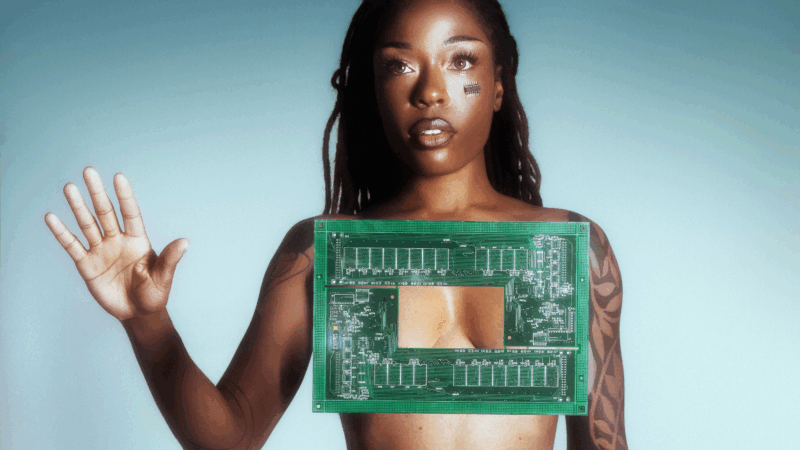In an era of techno-dystopia, Sudan Archives’ ‘The BPM’ imagines a liberated future
There’s a word that keeps popping up on The BPM, the stunning new album by Sudan Archives: sync. It is often used in the context of motion, wanting to align with someone else’s rhythm, but I kept thinking about the old process by which digital music libraries would be added to an MP3 player. There was a connection being made, running along the cable linking your computer to your iPod, or whatever other gizmo, all digital, but also mechanized and taken offline. After all, the player was an object housing the files in a way that made them accessible out on the street. Once the process was complete, the two repositories were paired but partitioned; adding new music from the library to the player required syncing again. That interfacing is at the center of The BPM, which wants to sync the real and digital selves, so that they are mirrored but localized.
The BPM follows a grief-stricken woman who comes into contact with her digital avatar, a siren dubbed “gadget girl.” “I’ve always been a gadget girl,” Brittney Parks, the singer and producer behind Sudan Archives, told The New York Times. “The more gadgets I’ve learned how to communicate with and use, the more powerful I became.” Over the course of two EPs and three albums, the artist has taken multi-instrumentalism seriously, using her background as a violinist as a baseline for an expansion into both classic and modern forms: mandolin, synthesizer, bass, keyboards, percussion and drum programming. With each release, there has been a greater emphasis on the gadgets, their signals and feedback. The BPM is an album that recognizes a cybernated world of augmented reality — not in the ridiculous, metaversal sense, but one where contact with an electronic device can bring about physical change, even growth. A subtext of club music is that “electronic” is an interface straddling analog and computational spaces, where a programmed input can result in a visceral output, and on this album Parks returns to the sounds of Detroit, where much of her family is, to conjure the liberated feeling beat engineering brings her.
It’s one in conjunction with the long-standing ethic of dance music, pulse and movement as a hard reset, only refreshed for her particular philosophy: the haptic feedback of producing inducing a kind of out-of-body experience. In a YouTube mini-doc on the album, Parks had an energizing take on our digital age. To her, staying human can mean augmenting yourself with technology, “computer-generated” being part of a holistic practice, not a simulated one. It’s easy to be overwhelmed by visions of a brain-rotted techno-dystopia, which somehow always seems nearly at hand, but Parks dares to dream of a future dictated not by delusions and dissociation but by the sync as a self-actualizing process.
The album feels like a case in point in more ways than one. The Sudan Archives project has always been built on the violin, it is her anchor and origin story, and has long been used to insinuate her groundedness, but this record is computerized in a deliberate way — not just offsetting rigid notions of chamber artistry but demonstrating that Parks’ outer string wonk isn’t at odds with her inner beat freak. Just as key to that origin story is making beats on an iPad and frequenting Los Angeles’ experimental club night Low End Theory. The BPM straddles house, techno, trap and R&B, but in the least binary ways possible. Throughout, the album feels unbound, not simply because dance music is physically freeing, but because, in embracing the gadget girl avatar, Parks has activated some latent part of her style and sound, decompartmentalizing ideas and ideals that were once stored on separate drives; syncing them. That integrated electronic archive gives way to rich cultural and personal chronologies, too. When she sings, “The BPM is the power,” over and over on the title track, it is as if she is literally tapping into an energy source allowing for such a self-fullfilling, hypermedial mechanism to take place.
But beyond The BPM‘s odes to electronic music, its sound is one of melding the vulnerable person you are IRL with the confident free spirit you can be virtually. For Parks, that isn’t simply “being online” but exploring herself through the many machines she uses to produce music. Just look at the cover, which depicts the artist as a cyborg wired to some unseen mainframe. In the doc, Parks notes that she is drawing from her on-stage setup, where she is connected to various contraptions all converging to a singular outflow. (To get some sense of her system, watch her play violin and DJ simultaneously while rolling around in a doorless Bronco for a live performance of “DEAD,” or operate an Akai drum machine and a pedalboard mid-Dungeon Session for “ChevyS10.”) The cover is such a stark contrast to the one on her debut album, 2019’s Athena, which cast her in bronze, holding her primary instrument up with one hand like a totem as if she was acting in deference to its history and the corresponding power. The violin is still featured prominently, but now it exists as part of an array, another tool in an arsenal allowing her to travel through cords along an information superhighway of her own making. And the music of The BPM, like its cover, is about traversing that technologic expanse to realize a modified version of the self extending beyond physical limitations.
A Jan. 6 rioter pardoned by Trump was sentenced to life in prison for child sex abuse
Since receiving presidential pardons, dozens of former Capitol rioters have gotten into more legal trouble. In Florida, Andrew Paul Johnson was sentenced to life in prison for child sex abuse.
President Trump, Pam Bondi sued over sale of TikTok assets
The case, filed in a federal court in Washington, D.C., accuses the Trump administration of ignoring legislation designed to stop the spread of Chinese propaganda — and instead helping to broker a partial sale to businessmen close to Trump.
A rift between Spain and Trump widens over Spanish opposition to the Iran war
The Spanish government reiterated it would not let U.S. forces use two joint military bases in Spain as the U.S.-Israeli war in Iran escalates, widening a rift with the Trump administration.
Blackpink, modern K-pop’s trailblazing group, tries to find its way home
A new mini-album finds the world's biggest girl group in a tight spot: competing with its own legacy.
If you loved ‘Sinners,’ here’s what to watch next
So you loved best picture nominee Sinners. What should you watch next? We asked our audience to share their recommendations. They suggested Near Dark, The Wailing and other vampire horror films.
U.S-Israeli strikes continue across Iran, Iranian drones hit Azerbaijan
The U.S. and Israel said they conducted new strikes inside Iran overnight, targeting ballistic missile launchers. Iran claimed it struck a U.S. oil tanker in the northern Persian Gulf.






